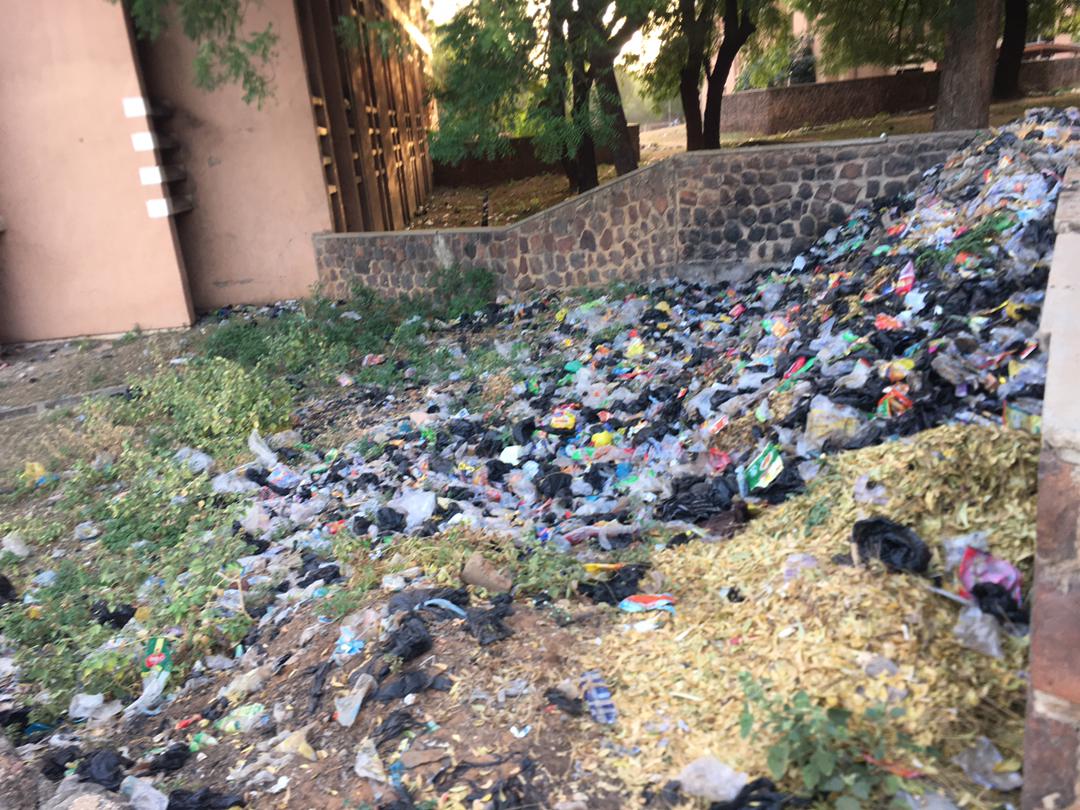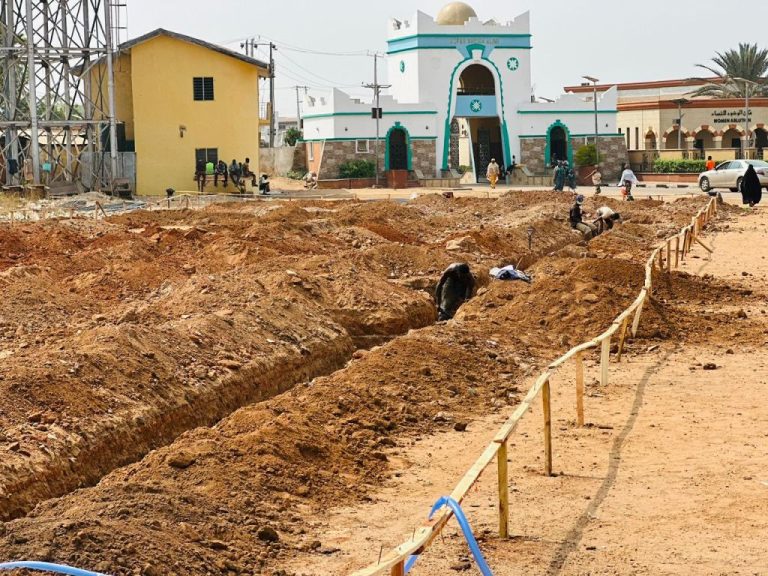In UDUS communities, students stay in polluted environment, suffer chronic health challenges
The dim of phone screens cast faint flashes inside the eight-person room of Jubril Aminu, one of the male hostels managed by Usmanu Danfodiyo University, Sokoto, (UDUS). Among the students, there is Habeeb Nasiru — a third-year student — bold, tall, fair-skinned, with a beard face. He lay on his bed, shivering despite being wrapped in sweaters and a thick wrapper. It was sometime in November, 2024.
The 27-years-old’s ailment confined him inside his hostel, despite having an exam the following day. Later that night, after regaining a bit of strength, he managed to make his way to the classroom.
Before Wednesday, Nasiru had already been affected by recurring illness, often diagnosed as malaria during visits to the UDUS clinic.
“The stagnant water and unsanitary environment in the hostels are major causes of this problem,” he explained. “Wastewater doesn’t flow as it should. Look at how nylon is littered everywhere, blocking the gutters. All these attract vectors and expose us to diseases.”
He continued, “We cook, wash, do everything in a dirty, unclean environment. Even in our mini market, the food we eat is exposed to flies because it’s not covered and these vectors are everywhere.”
Nasiru’s plight reflects the struggles faced by students in the UDUS community, stemming from filthy environments compounded by harsh weather conditions.
Nasiru is not alone. Adam Aliyu, a final-year student and fellow occupant of the Jubril Aminu hostel, had similarly spent days confined to his room in September due to a deteriorating health condition. His experience also highlighted the unhygienic conditions around the hostel as a primary cause of illness among students
When Aliyu first visited the clinic during his illness, he left with a disappointing experience, returning to his hostel without receiving even a Paracetamol tablet. Unable to walk, he had to take a bike back to his hostel that fateful day. “The first time I fell sick this semester, I went to the clinic believing I would get better,” he recounted. “But I ended up returning to the hostel without receiving any medication.”
“I called my mother when I realized my condition was worsening, and the exam was fast approaching. She sent me N10,000. The next day, I revisited the clinic and then went to a pharmacy in the school mini market to buy drugs worth N5,580 based on the doctor’s prescription.”
He couldn’t help but reflect on the dilemma students faced as they flocked to the school clinic, only to find that there was no medication available during the 2023/24 academic session. The struggle of students access to parallel healthcare was quite challenging, as clinic staff often directed them to purchase their prescriptions outside the hospital.
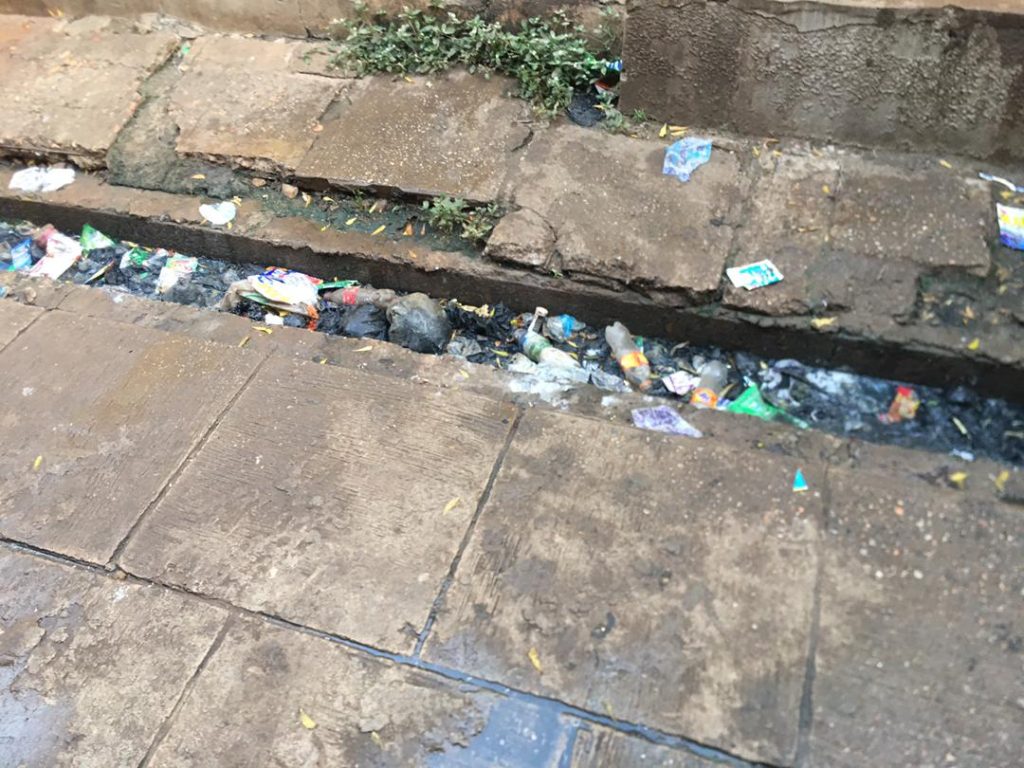
At a press conference in Abuja, the founder of Clean Up Nigeria (CUN), Prince Ene Baba Owoh Jr., revealed that their organization’s statistical data showed 32 out of the 36 states, including Sokoto and the Federal Capital Territory (FCT), were rated as unclean.
The condition of the UDUS environment is a reflection of a larger plight in Nigeria.
According to the CUN, an international non governmental organisation in a report published by PremiumNews said, over 176.3 million out of approximately 250 million Nigerians were living in unclean environments in 2022, up from 172 million in 2021. This data was included in their performance indicators from December 2021 to November 2022.
Concluding his speech, Mr. Owoh noted that although the practice of open defecation had decreased from 34% in 2021 to 28% in 2022, Nigeria still ranked first globally in open defecation from 2018 to 2022
Uncovered Water Tank
Initially trapped in lethargy, Aliyu became increasingly worried about the uncovered water container in their hostel after realizing the health risks posed by the unhygienic water from the tank.
Exposed for long periods, the water in the tank was often contaminated by lizards, cockroaches, and other reptiles that had died inside. This fear of contamination forced many students to source water from other hostels.
“At first, I was indifferent about the water coming from the uncovered tank. But over time, I began questioning the impact of the water I was consuming on my health,” he said.
“The way wind carries germs into the exposed tank has forced some students, who can’t tolerate it, to fetch water from other blocks.”
Jalaludeen Musbau, another resident of Jubril Aminu Hostel, noted that the water tank in their block had been left uncovered for an extended period. This raised concerns about the cleanliness and safety of the water, as debris, leaves, and other contaminants often found their way into the tank, compromising its quality.
The third-year student expressed concerns about the unpleasant odor and taste of the water, which pointed to possible contamination. He added that several of his fellow hostel residents had reported similar health issues.
Due to concerns over the safety of the water from the uncovered tank, sourcing drinkable and usable water from another block has become a regular practice for Musbau and many other students. “The stress of getting water from another block is taking a toll on us,” Musbau said.
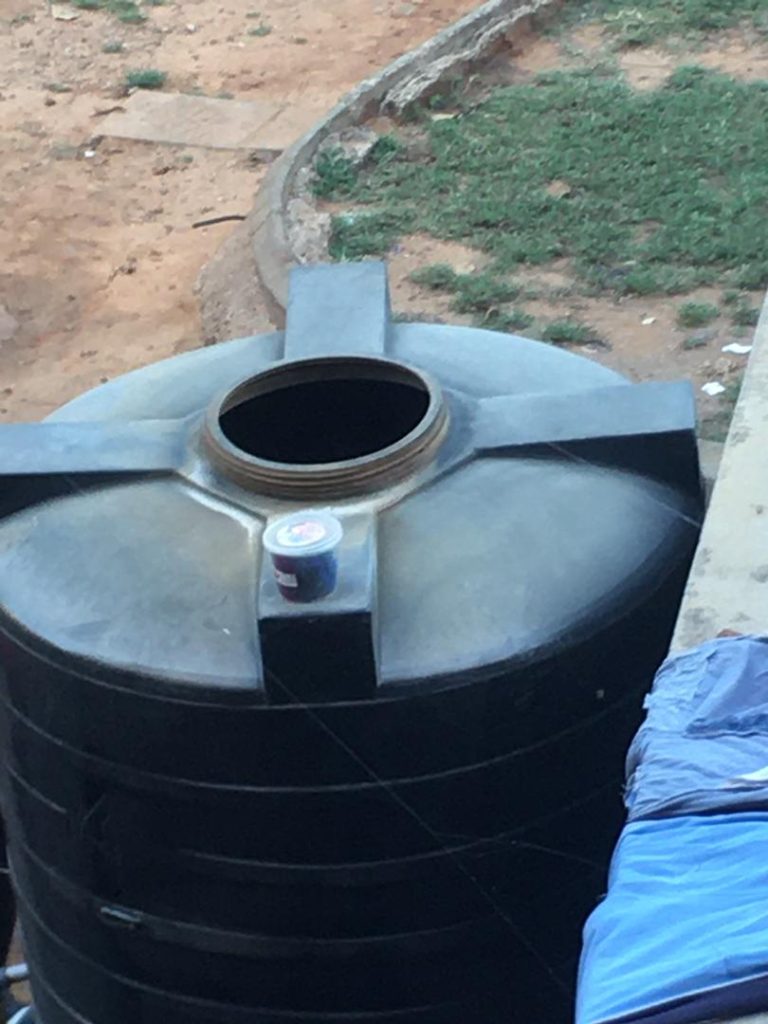
The lack of access to safe water has severe consequences. A 2021 UNICEF report revealed that 73% of the diarrheal and enteric disease burden in Nigeria was caused by inadequate access to water, sanitation, and hygiene (WASH), disproportionately affecting poorer children.
The report further noted that only 26.5% of the population had access to improved drinking water sources and sanitation facilities, with rural areas accounting for 64.1% of the need for improved sanitation services.
Breeding Malaria through Plantations
For Abdullahi Ridwan—a bold, dark-skinned, moderately tall young man in his mid-20s—his concerns extended beyond the unhygienic environment. His story highlighted how village farmers around the university littered the campus with plantations scattered across its four corners.
The final-year student (now a graduate) was shocked by the unchecked freedom enjoyed by these farmers, who cultivated crops near lecture halls and student hostels.
He blamed the school management for their silence on the issue, noting their failure to impose restrictions on areas where farmers could establish their farmlands.
“The university environment is cluttered with plantations. Can you imagine crops being planted right next to our lecture halls and hostels? These farmlands often breed mosquitoes that spread malaria.”
“Our male hostels really need attention. The gutters, bathrooms, and even the hostels themselves are left untidy.”
He continued, “I’ve been sick twice this semester. The first time, I couldn’t get any of the prescribed medication from the clinic. The second time, I only received one medication and was directed to buy the rest at a pharmacy outside the clinic.”
As a student, the unavailability of drugs in the school clinic led to unexpected expenses, forcing him to cut his budget and struggle with the financial burden.
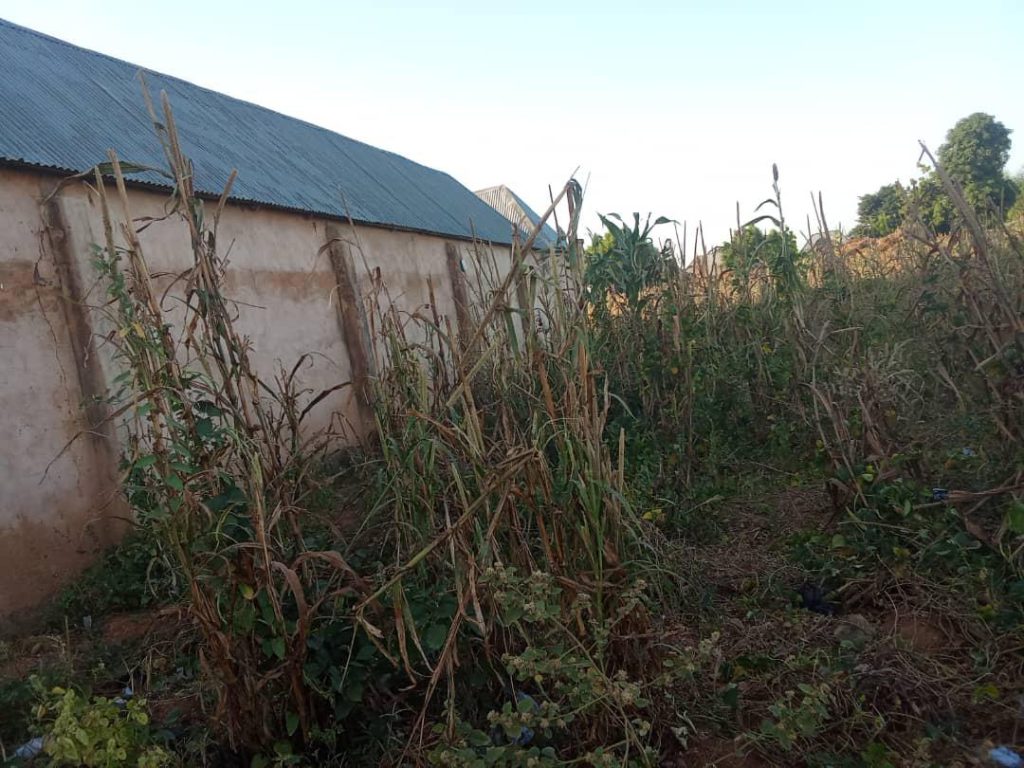
Similarly, Muhammadu Muhammadu, a penultimate student living in one of the university’s private hostels, recalled how their villa was surrounded by farmlands during the rainy season, with villagers planting millets, beans, and other crops. “This has led to an influx of mosquitoes into our hostel, exposing many of us to malaria,” Muhammadu noted.
Unlike other students who visited the school clinic when they were sick, he sought treatment directly at the mini-market pharmacy due to the operational issues at the university clinic.
“It’s not always easy. I don’t usually have money when I fall sick. Sometimes, I call home to get money for the drugs, but many times I have to buy them on my own.
“This is really difficult for me because, like everything else in Nigeria, the price of drugs keeps increasing.”
Underfunding — a Death Blow to Health Sector in Nigeria
Speaking on the challenges faced at the UDUS clinic, Director Ibrahim Umar highlighted inadequate funding as the primary issue, which often forces students to seek medications outside the school facility.
He also observed that the clinic lacks sufficient staff to effectively deliver healthcare services, further worsening the challenges faced by students.
“The clinic doesn’t have enough funds to sustain its operations. Even the light bulbs are not functional, and fueling the generator is a major challenge. Whenever we try to purchase fuel, it depletes all the money we had allocated for other necessities,” he added.
“Among all the service departments in the university, we have the least number of staff. There are only 65 of us in this clinic, yet everyone depends on our services. How do you expect things to run smoothly under such conditions?”
The financial difficulties faced by the UDUS clinic are not unique. Almost all public healthcare centers in Nigeria struggle with inadequate funding.
The federal government allocated only 5-percent of its budget to the health sector in 2021, a significant shortfall from the 15-percent commitment made under the 2001 Abuja Declaration. This underfunding has contributed to numerous challenges in Nigeria’s healthcare system, including the rise in outbound medical tourism, deteriorating medical infrastructure, inadequate government investment, and the poor compensation that drives skilled healthcare workers to emigrate.
A Premium Times report revealed the poor state of Nigeria’s oldest hospital in Lagos, the country’s richest state, highlighting the severe impact of underfunding. This shows that the health sector is not being prioritized by the government.
With a rapidly growing population of 5.5 live births per woman and an annual growth rate of 3.2%, Nigeria’s population is expected to reach 400 million by 2050, becoming the third most populous country in the world. Yet, the country’s healthcare system is underdeveloped, with inadequate facilities and a shortage of medical professionals. WHO estimates that Nigeria has only about 35,000 doctors, far below the 237,000 needed.
Nightmare at UDUTH Campus
Usmanu Danfodiyo University Teaching Hospital (UDUTH), a key healthcare center in Sokoto, is often overcrowded, with long queues making access to immediate medical care difficult for students living nearby.
Mutalib Jubril, who visited the National Health Insurance Scheme (NHIS) clinic at UDUTH for severe malaria, did not expect the ordeal he faced. After waiting for 10 hours, he left the clinic exhausted and frustrated.
Jubril blamed the spread of illnesses among students on the poor hygiene and unsanitary conditions around the university.
“There was a time I went to the NHIS clinic at UDUTH around 8 a.m., but I wasn’t attended to until 5 p.m. This is why many students look for alternative healthcare options,” he said.
He also noted that stagnant water, poor hygiene, and inadequate sanitation around the hostels contribute to frequent cases of malaria, cholera, and typhoid among students.
According to the World Health Organization (WHO), the relationship between humans and the environment significantly impacts the quality of life, health disparities, and overall life expectancy.
WHO estimates that maintaining a healthier environment could prevent approximately 13 million deaths annually and reduce 13% to 37% of the global disease burden, including 40% of malaria deaths, 41% of deaths from lower respiratory infections, and 94% of deaths from diarrheal diseases.
In Nigeria, environmental health risks have become a growing concern, driven by issues such as water pollution, erosion, and flooding caused by inadequate drainage systems, often stemming from human activities.
These challenges contribute to the spread of disease vectors, infectious diseases, and poor hygiene and sanitation, underscoring the urgent need for effective environmental management and public health interventions.
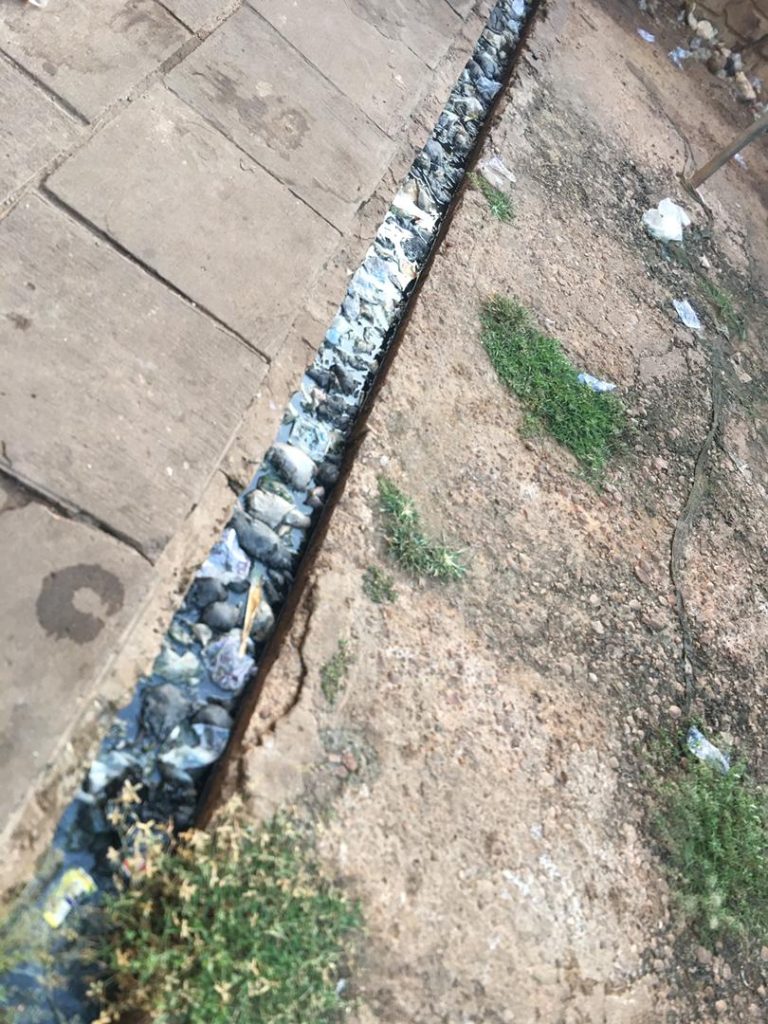
Musa Yusuf, a student residing on the UDUTH campus, prefers seeking treatment at private clinics rather than relying on the university’s health facility. However, this choice comes at a significant financial cost, as he frequently spends heavily on healthcare. His decision stems from frustration with the long queues at the UDUTH clinic, which often leave students waiting for hours without receiving attention.
“I’ve heard of cases where students stay in line for hours and still don’t get attended to. That’s why I always avoid that scenario,” he explained.
“I frequently suffer from typhoid because of the water I consume, and the harsh climate also takes a toll on me. Sometimes, I question why I chose to come here.”
Insights from Environmental Expert
During an interview, Emmanuel Kilaso, the Executive Director of Securecycle, an environmental and climate change initiative, highlighted parasitic infections and waterborne diseases as significant health challenges resulting from unsanitary environments.
Mr. Kilaso also pointed out the deteriorating infrastructure as a major obstacle to effective sanitation in Nigeria, attributing it to the outdated waste disposal and management systems still in use. As a result, he expressed doubts about Nigeria’s ability to achieve Sustainable Development Goal (SDG) 6 — Clean Water and Sanitation — by 2030. SDG 6 is one of the Global Goals for Sustainable Development set forth by the United Nations.
He emphasized the need to address and revamp waste management policies, stating that every community should have a designated waste center, and each local government ought to have a standby collection center.
Furthermore, Mr. Emmanuel noted that establishing an enabling society is a core responsibility of the government. He identified funding support, well-defined policies with strict implementation, and adequate infrastructure as key solutions to the issue of unclean environments affecting the country.
Highlighting the importance of education in addressing poor sanitary conditions, he remarked, “Educational institutions are known for their innovation and problem-solving capabilities. They need to collaborate with students to develop alternative solutions for maintaining a hygienic environment and to raise awareness about the challenges posed by unsanitary conditions.”
UDUS Management React
In an interview, the Dean of Students’ Affairs, Prof. Umar Aliyu, emphasized the university management’s commitment to prioritizing students’ well-being in and around the hostels. He noted that the university employs both casual and permanent workers to maintain cleanliness across the campus.
He explained, “There are casual and permanent workers assigned to cleaning the hostels, toilets, washing, and other tasks. We provide them with all the necessary materials to carry out their duties, and we ensure they are given supplies on a monthly basis. We are confident that what we provide is sufficient.”
He added, “Had you come yesterday, you would have seen them. It was just yesterday that my deputy distributed materials to the cleaners.”
When asked about growing complaints regarding plantation activities, Prof. Umar responded, “I am not aware of anyone planting crops around the hostels.”

